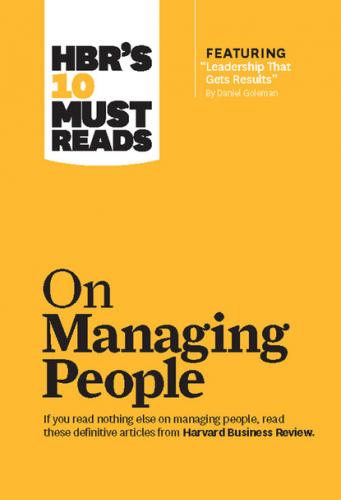HBR's 10 Must Reads on Managing People (with featured article "Leadership That Gets Results," by Daniel Goleman). Daniel Goleman
which were never theirs because all their time was given over to checking the work of their subordinates. For example, in the R&D division of one large chemical company I know of, the supervisors of the laboratory assistants were theoretically responsible for their training and evaluation. These functions, however, had come to be performed in a routine, unsubstantial fashion. After the job enrichment program, during which the supervisors were not merely passive observers of the assistants’ performance, the supervisors actually were devoting their time to reviewing performance and administering thorough training.
Change in attitudes toward tasks in company experiment
Mean scores at beginning and end of six-month period
Enlargement versus enrichment of correspondents’ tasks in company experiment
Horizontal loading suggestions rejected
What has been called an employee-centered style of supervision will come about not through education of supervisors, but by changing the jobs that they do.
_____________________
Job enrichment will not be a one-time proposition, but a continuous management function. The initial changes should last for a very long period of time. There are a number of reasons for this:
• The changes should bring the job up to the level of challenge commensurate with the skill that was hired.
• Those who have still more ability eventually will be able to demonstrate it better and win promotion to higher level jobs.
• The very nature of motivators, as opposed to hygiene factors, is that they have a much longer-term effect on employees’ attitudes. It is possible that the job will have to be enriched again, but this will not occur as frequently as the need for hygiene.
Not all jobs can be enriched, nor do all jobs need to be enriched. If only a small percentage of the time and money that is now devoted to hygiene, however, were given to job enrichment efforts, the return in human satisfaction and economic gain would be one of the largest dividends that industry and society have ever reaped through their efforts at better personnel management.
The argument for job enrichment can be summed up quite simply: If you have employees on a job, use them. If you can’t use them on the job, get rid of them, either via automation or by selecting someone with lesser ability. If you can’t use them and you can’t get rid of them, you will have a motivation problem.
Originally published in September 1987. Reprint R0301F
Конец ознакомительного фрагмента.
Текст предоставлен ООО «ЛитРес».
Прочитайте эту книгу целиком, купив полную легальную версию на ЛитРес.
Безопасно оплатить книгу можно банковской картой Visa, MasterCard, Maestro, со счета мобильного телефона, с платежного терминала, в салоне МТС или Связной, через PayPal, WebMoney, Яндекс.Деньги, QIWI Кошелек, бонусными картами или другим удобным Вам способом.
